In some special conditions, such as cold weather or extreme weather, diesel engines may become difficult to start. In such cases, starting fluid can be a helpful tool for the owner.
How can you safely and effectively start a diesel engine with starting fluid? Don’t worry, in this article, we will provide a comprehensive overview of starting fluid and various methods for starting a diesel engine.
Part 1. What is Starting Fluid? And Its Benefits?
What is starting fluid? Well, starting fluid is a common technique used to start diesel engines and is specifically designed to aid in engine startup under challenging conditions.
Its main components are volatile fuels, usually containing ethanol or ether, which ignite diesel fuel during cold starts.
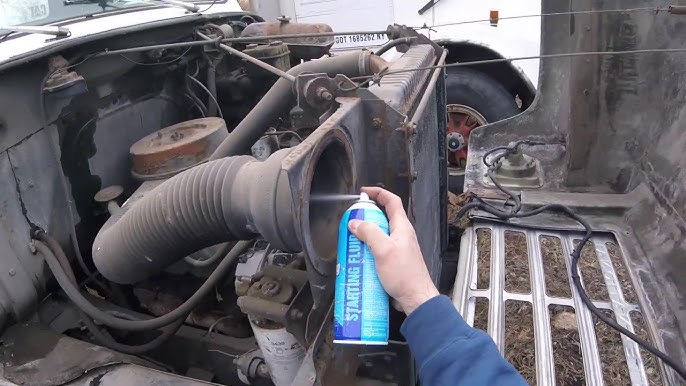
What are the Benefits of Starting Fluid?
Improve Cold Start Success Rate: In low temperatures, diesel fuel does not readily vaporize, making it difficult to ignite. Starting fluid can make ignition easier and successfully start diesel engine in cold weather.
Quick Start: Using starting fluid can speed up engine startup because it burns quickly after entering the cylinder, providing immediate ignition.
Reduce Engine Wear: When an engine is hard to start, repeated attempts may be necessary when starting it, which increases the wear on internal engine components. Starting fluid helps the engine ignite quickly, reducing wear during startup.
Solve fuel system issues: When the fuel system of a diesel engine has problems, it can lead to an unstable fuel supply. In such cases, starting fluid can temporarily provide additional fuel for combustion, helping the engine start.
Part 2. How to Start a Diesel Engine with Starter Fluid?
Step 1: Check Engine Condition
Before using starting fluid, you should ensure that the engine’s oil, fuel, and battery are in good condition. Any potential mechanical issues may affect the start-up performance.
Step 2: Remove Air Filter
Remove the air filter so that the starting fluid can be sprayed directly into the intake system.
Step 3: Spray the Starting Fluid
Then, you can spray the starting fluid into the air filter intake or directly into the intake manifold, but be careful not to spray for too long to avoid damaging the engine.
Step 4: Start the Engine
After spraying the starting fluid, you can immediately start the engine. If the engine does not start after a few tries, you should perform further inspection.
Step 5: Reinstall Air Filter
Once the engine has started successfully, you should install the air filter to ensure normal operation.
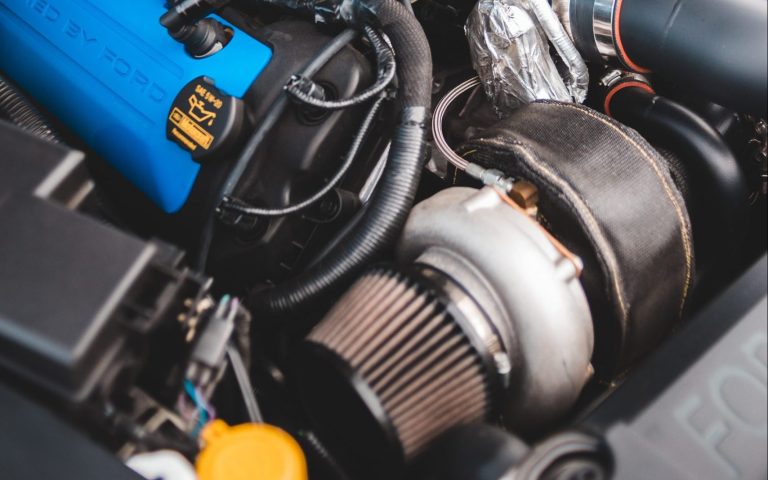
Part 3. Cautions When Using Starter Fluid
Although starter fluid can start a diesel engine, there are certain risks associated with its use, so it should be used with caution.
Avoid Overuse: Excessive starter fluid use can cause the engine to overheat or even damage it.
Avoid Frequent Use: Relying on starter fluid too frequently may mask other potential engine problems. If the engine frequently requires starter fluid to start, it is recommended to check other engine components.
Safe Operation: Since starter fluid is composed of flammable substances such as ethanol or ether, it should be kept away from open flames and used in a well-ventilated environment.
Incompatibility with Engines: Some diesel engines with glow plugs or direct injection systems may not be compatible with starter fluid. In such cases, using starter fluid can cause more serious damage to the engine and should be avoided.
Part 4. Best Starting Fluid for Diesel Engine
You might be looking for the best starting fluid for diesel engines. Here, we list some popular starting fluid options available in the market. You can refer to it for more information.
1. Prestone Starting Fluid
Prestone starting fluid contains a high concentration of ether, which is ideal for cold-weather starting. It’s designed to work in temperatures as low as -65°F (-54°C), making it one of the most effective options for extreme cold.
It is suitable for diesel and gasoline engines, as well as farm equipment and large trucks.
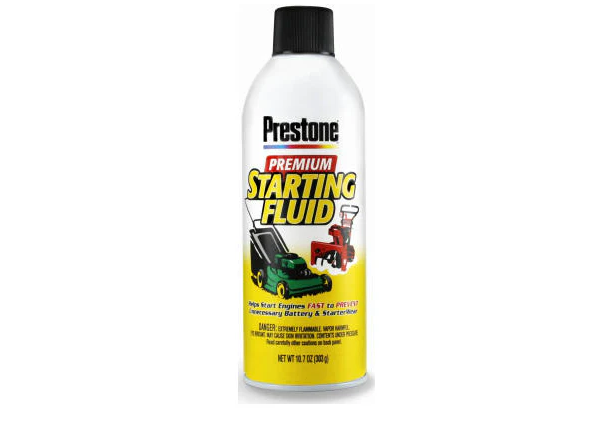
2. STA-BIL Starting Fluid
STA-BIL starting fluid contains upper cylinder lubricants that protect engine components from wear during start-up. The formula is effective in cold weather and helps engines with low compression or fuel problems start up.
It works well with both gasoline and diesel engines and is commonly used in marine engines, farm equipment, and construction machinery.
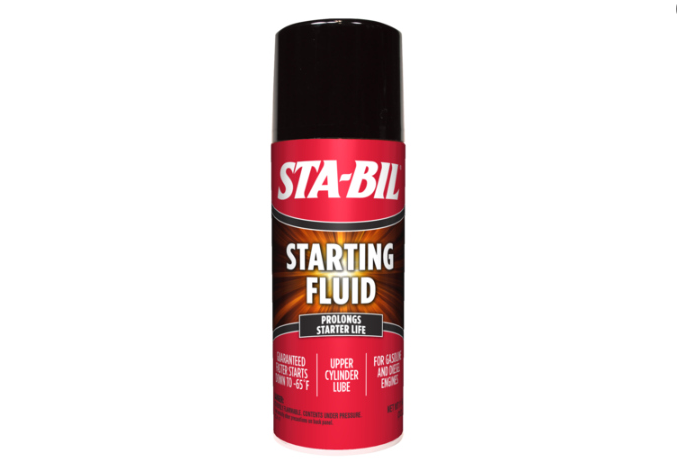
3. Gunk Starting Fluid
Gunk starting fluid, known for its fast and effective engine starting in cold weather, is designed to provide a quick ignition boost. It contains ether and a lubricant to reduce engine wear during start-ups.
It’s effective with diesel and gasoline engines, including trucks, tractors, and lawnmowers.
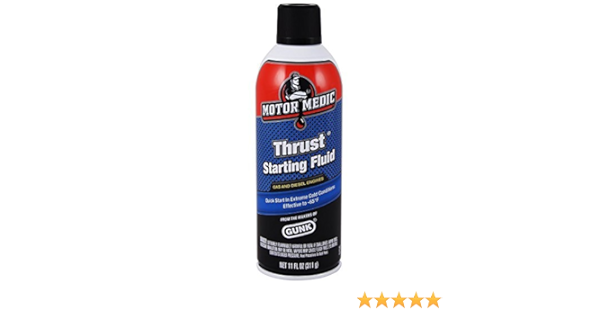
Part 5. Diesel Starting Fluid Alternative: Spring Starter
Compared with starting fluid, the spring starter is the best and safest starting fluid alternative. It can start engines in challenging situations such as extreme weather, marine, and emergency rescue scenarios with ease.
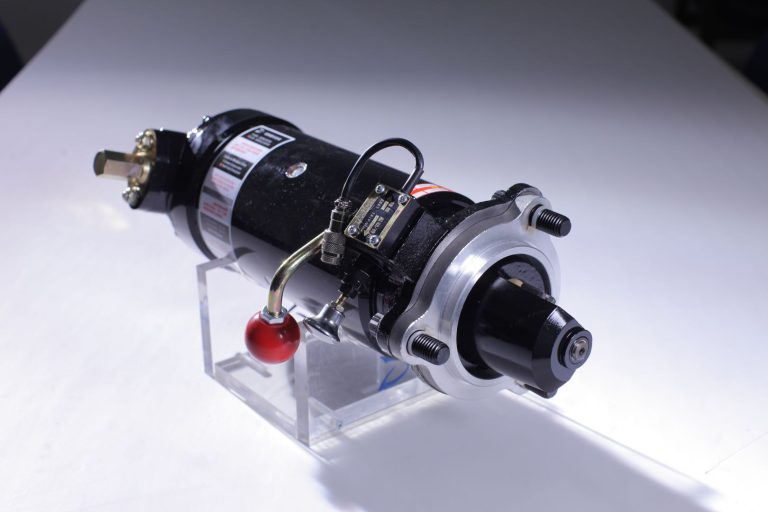
Why Spring Starter is the Best Starting Fluid Alternative?
Apply for Harsh Environment
The robust mechanical design of the spring starter makes it an ideal choice for a wide range of challenging environments. Its durability allows it to operate reliably at high and low temperatures, quickly adapting to extreme conditions.
Higher Safety
Compared to starting fluid, spring starter has greater safety. It is fire-resistant and explosion-proof, eliminating the risks of flammability, explosions, and chemical exposure. This provides a higher level of protection. In situations where safety is crucial, the spring starter is a reliable and secure choice for starting diesel engines.
Maintenance-Free & Long-Lasting
Spring starter features excellent corrosion resistance and a straightforward mechanical design, making it a nearly maintenance-free starting solution. Its sturdy and durable construction makes it a cost-effective and long-lasting starting device.
Easy Installation & Operation
The installation process of the spring starter is simple and quick. It requires no complicated electrical wiring or fluid injection. Simply placing it in the designated position and following the basic starting steps is all that’s required to start the engine, eliminating the need for additional training or complicated procedures and reducing the need for specialized skills.
Similarly, except spring starter, generator heaters, glow plugs, and battery starters can also be used as tools to start a diesel engine. However, in complex environments, we still recommend the spring starter as the preferred choice for starting a diesel engine due to its ease of use and greater safety.
Final Verdict
Using starting fluid can temporarily solve cold start or engine cranking issues. However, starting fluid is not the only solution for starting a diesel engine. In terms of safety and efficiency, the spring starter can be a better option.
FAQs about Starting Fluid
1.Can starting fluid be used in diesel engine?
Yes, starting fluid can be used in diesel engines and is often used to help start the engine in cold weather or under difficult starting conditions.
However, it’s crucial to use starting fluid cautiously. The starting fluid might not be compatible with every diesel engine. More importantly, you should be aware of safety issues, as it is highly flammable.
2.Where to put starter fluid in diesel engine?
To use starting fluid in a diesel engine, you should first locate the air intake where the air filter is located, remove the air filter or any obstructions to gain access to the intake. Then, you can spray a small amount of starting fluid directly into the intake for a few seconds and start the engine.
3.What is starting fluid made of?
Starting fluid is typically composed of a highly flammable blend of chemicals, primarily including ether (such as diethyl ether) or other volatile hydrocarbons like propane or butane.

